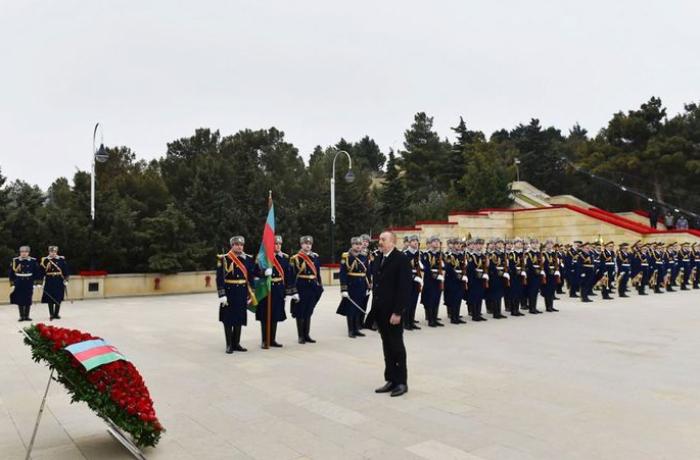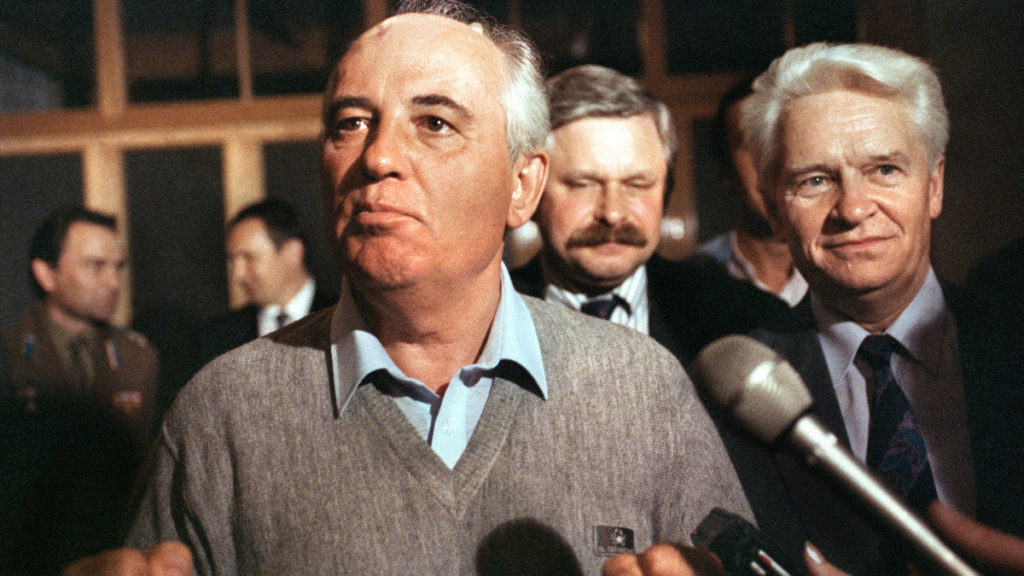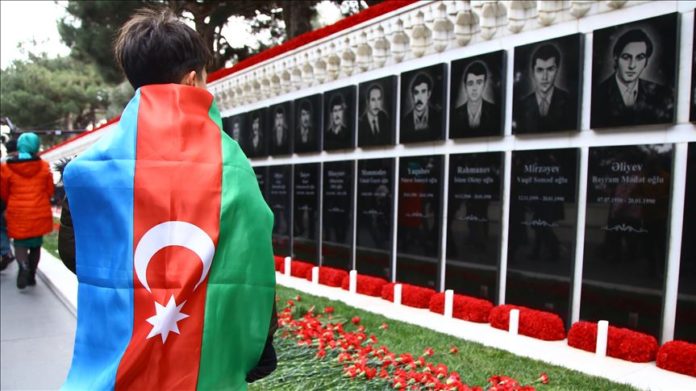Black January is the day of “Martyrdom” for the people of Azerbaijan which changed the course of history and geography too. On January 20, the people of Azerbaijan pay tribute to all its martyrs who were victims of state terrorism and crime against humanity on part of the former USSR. It marked the beginning of the end of Soviet rule in Azerbaijan.
Despite difference of faith, sects, societal strata, political affiliations and economic priorities, Azeri people were united by “Grief, Black January” during which innocent children, weaker factions of the society and men were massacred by the Russian troops. It was an act against humanity, a gross violation of basic human rights. It was a battle between tanks and think-tanks, riffles and political resolve, deadly weapons and self-determination, guns and gravels, military force and martyrdom and ultimately, the human spirit became victorious. It was the blood of so many people which subsequently succeeded in defeating the beast. The collective act of courage, bravery and determination was the turning point in the national and political history of Azerbaijan and subsequently it achieved the ultimate goal of independency.
Black January: A Turning Point
It is one the bitter lessons of the human civilization that naked power has been defeated when used against people who strive to achieve independence. History was repeated in case of Azerbaijan, the Black January proved a “turning point” in its national history. The massacre did not alter the will of the people of Azerbaijan. Despite being subjected to military, political and moral aggression, Azerbaijani national movement succeeded in standing against Soviet challenge, and Soviet troops eventually had to withdraw from Baku. Subsequently Azerbaijan declared its independence on October 18, 1991.
Great Symbolism
January 20th bears rich symbolism for many in Azerbaijan and throughout Eurasia. On that day, the majority of the people of Azerbaijan lived through the personal transformation of a burning Soviet identity and becoming citizens of an independent Republic of Azerbaijan at a time when such independence seemed unreachable.
Grief and Azerbaijan’s Rich Diversity
Grief united Azerbaijanis and cemented its rich diversity which it still holds as an ideal hub of “multiculturalism” in the region as well as world. Martyrs included a young Azerbaijani boy, a teenage Jewish girl, an elderly Russian man and many others from different ethnic and religious backgrounds. The tragedy united the people of Azerbaijan into a community of citizens of an independent nation and strengthened their resolve to achieve that independence.
Azerbaijani people still remember the tragic day of January 20 as if it happened yesterday. Hundreds of civilians were crushed or injured by the Soviet troops in Baku on January 20, 1990 on an order from the USSR leadership trying to maintain the Communist regime in Azerbaijan and strangle the national liberation movement but they miserably failed.
Azerbaijan’s Resolve and Collapse of USSR
Although the Soviet government attempted to rewrite history, claiming the massacre was a measure to protect Russians and Armenians, the sole objective was to maintain rule of the Communist party in Azerbaijan and make it an example for the organisers of resistance movements in other republics. It was day in which hundreds of Azerbaijanis stood up to communist rule. After black January, every effort to keep Azerbaijan under Soviet Rule proved unsuccessful.
Though the Azerbaijani people suffered military, moral and political aggression, they showcased their ability to maintain the traditions of historical heroism and resist the cruelest attacks for the sake of freedom and independence of their motherland, even at the cost of losing their lives. The sons of the motherland perished on January 20, 1990 while defending the freedom and independence of Azerbaijan and with their bravery made history. Subsequently, Azerbaijan declared independence on October 18, 1991. And today the Azerbaijanis are proud of those who are ready to perish for the sake of their people’s national identity.
Indiscriminate Killings
The date of 20 January is written in blood for Azerbaijanis across the world. The suppression was brutal and uncompromising. In all 133 Azerbaijani civilians were killed and approximately 700 were wounded, victims included the elderly, women, children, and even medical personnel. The killings were indiscriminate, with the slain including Azerbaijanis, Russians, Jews and Tartars. In addition to the massacre in Baku, killings also took place in the Lenkaran and Neftchala regions of Azerbaijan, claiming the lives of 26 people.
Mikhail Gorbachev on 27 April 1997 commented that: “Proclaiming the state of emergency in Baku and sending an army to the city was the biggest mistake of my political life.”

President of Azerbaijan H.E. Ilham Aliyev
President of Azerbaijan H.E. Ilham Aliyev paid a tribute to 20 January shahids in Martyrs’ Lane on this National Mourning Day, he visited the graves of shahids and laid a wreath at the Eternal Flame monument. Government officials, foreign diplomats and members of the public visit Martyrs’ Avenue, where the victims of the 20 January tragedy are buried. A variety of events conferences, round tables, photo exhibitions and documentary screenings were held in many countries.
Nationwide Media Coverage
At the same time, the newspaper Azerbaijani Congress and other media published articles dedicated to the January 20 tragedy. Azerbaijanis living in countries throughout Europe held a variety of events dedicated to the January 20 anniversary.
Throughout the world and especially in Azerbaijan every year Black January victims are remembered with great sorrow. In 2017, the 27th anniversary of the nationwide tragedy has been marked in many countries of the world. According to the State Committee on Work with Diaspora, a number of events were took place on this occasion in the Pakistan, United States, Canada, Australia, Turkey, Russia, Germany, Poland, Hungary, Lithuania, Latvia, Georgia, Kazakhstan, Kyrgyzstan, and other countries.
Martyrs Avenue
On that day millions of Azerbaijani visit the Martyrs Avenue. The Martyrs, who died in that day, are among the first who sacrificed their lives for freedom that Azerbaijan nowadays enjoys and those heroes will never be forgotten. The sons and daughters of the Motherland killed on that terrible night have written the brightest page in history of Azerbaijan, and paved the way to national liberation and independence of the Azeri people.
Martyrs of 20th January
In 1994, the National Assembly of Azerbaijan approved a full political and legal report evaluating the Black January events. On 16 December 1999, the former President Heydar Aliyev declared that all victims of Black January would be awarded the honorary title of 20 yanvar şəhidi “Martyrs of 20th January”. The memorial called “Martyr’s Lane” was constructed to preserve memories about those who lost their lives. Every year Azeris come to lay flowers and remember the struggle for independence.
Black January & Azeri Human and National Characters
It reflects their courageous resolve against aggression. It shows their strong nationalism to protect their national sovereignty and dignity. It upholds their strong will towards free choice, freedom of expression and association and humanity. It shows the strong character of its leaders and people alike to stand against naked power and say no to use of power in resolving any conflict. It once again proves that abuse of power achieves nothing but widespread condemnation, isolation and ultimately disintegration. The sacrifices of courageous sons of the soil are cherished in the hearts of the people as beacons of hope and self-determination. It is also called black January, Saturday in the national history of Azerbaijan.
Height of Heroism
More than twenty seven years passed since the bloody day i.e. 20 January. On this day, Azerbaijan people struggling for the freedom and territorial integrity for Azerbaijan showed heroism, the battle was between Azerbaijan people’s blood and former USSR brutality. It was the battle between people’s power and illegal possession. It was the onslaught of tanks and gunfire and show of grand sacrifices. The night of 19 January and the following day left bitter memories.
Conflicting Realities
Days before 20 January, tensions between Azeris and the Soviet Union had been building; the collapse of the Soviet Union was clearly imminent. One by one, former satellite countries were shaking off the chains which bound them to the Soviets, and Azerbaijan was the leader in demanding freedom in the Caucasus region.
Human Tragedy
The Soviet aggression against Azerbaijan during 70 years came to the end with the bloody tragedy on January 20, 1990. On January 20, 1990 Soviet Union attacked the capital Baku. 26,000 Soviet troops stormed the capital and began shooting indiscriminately and crushed many with tanks. Many people were arrested and hundreds tortured. A vast majority of the casualties were civilians, with over 700 wounded. Almost the whole population of Baku turned out to bury the dead on the third day after the massacre on 22 January. The traditional 40 day mourning period was marked by a national strike in honor of those who had stood up and sacrificed their lives for freedom. Factories ground to a standstill and people stayed home from work.
It was the fight of a massive popular uprising in the capital, calling for Azerbaijan’s independence from Moscow and a collapsing empire. It was a military operation which was totally planned and calculated acted out.
Mourning of Martyrs of Independence
The brutal regime failed utterly. After the massacre, tens of thousands of the young and old, men and women, Muslims, Jews and Christians filled the streets to mourn the victims, and a general strike in honour of the dead shut down the city for 40 days.
Leadership of Heydar Aliyev
Heydar Aliyev came to the Azerbaijan SSR’s office in Moscow and denounced the bloodshed. The father and former President of Azerbaijan stood against all odds and condemned this attack as a crime against humanity while living in Moscow at that time. He extended his support to people and fought bravely for the independence of his beloved country and ultimately succeeded.
His defiance helped to inspire the Azerbaijani people and Aliyev became a leader of the struggle for liberty. The force could not stop the people of Azerbaijan from seeking freedom, in fact it only increased their resolve to re-establish a free and independent Azerbaijan. His defiance helped to inspire the Azerbaijani people and Aliyev became a leader of the struggle for liberty.
Aggression against Supreme Human Values
Soviet forces occupied the city, but they did not break the Azerbaijanis’ drive for independence. Hundreds of Azerbaijanis turned in their communist party cards, and on January 22, after the Soviet violence had died down, the Supreme Soviet of the Azerbaijan SSR met and condemned the actions of the Soviet forces.
Moscow’s Memorial Human Rights Society and Helsinki Watch were among the organizations which denounced the attacks against unarmed civilians and even ambulances. And with time, the world came to know what had happened in Baku.
Helsinki Human Rights Watch Details
| Human Miseries | Details |
| Heinous violations of human rights | They even attacked medical personnel, ambulances and hospitals. |
| Attack/Aggression | It termed it illegal and crime against humanity |
| Deaths | More than 200 killed, 611 men wounded, 841 men illegally arrested and 5 missing. Moreover, soldiers were also sacked |
| Damage to personal properties & Collaterals | More than 200 houses and apartments were burnt, 80 automobiles, including ambulance cars, the state and personal properties were severely damaged. |
Findings of Human Rights Watch
A report titled “Black January in Azerbaijan” upholds that the violence used by the Soviet Army on the night of January 19-20 was so out of proportion to the resistance offered by Azerbaijanis as to constitute an exercise in collective punishment.

Siege of Darkness
Soviet Union took the following steps in order to besiege the Azerbaijan people and its aspirations but ultimately they failed. Mikhail Gorbachev broke Article 119 of the USSR Constitution and Article 71 of the Constitution of Soviet Azerbaijan when he signed the order introducing a state of emergency in Baku from 20 January 1990.
i. The Azeri Supreme Soviet and other political bodies were paralyzed.
ii. Weapons were gathered from militia employees under the pretext of population disarmament.
iii. Blockage of televisions and stopped the broadcasting in Azerbaijan on January 19 in order to deprive population from getting information.
iv. Foreigners were not allowed to enter to Baku.
v. Western reporters were banned from traveling to Baku to cover the events.
vi. Soviet Defense and Interior Minister, and military officials came to Baku some days before, for realization of this calculated terrorist attack.
vii. Soviet reservists were prepared for the special mission, had been mobilized and sent to the region for fighting.
Independence’s Journey
The journey of Azerbaijan people towards independence and preserving of the territorial integrity of their country began in 1988 and eventually developed into a national liberation movement. The failure of the USSR government to envision renewed Armenian claims on Azerbaijan’s territory, and separatist activities in Nagorno-Karabakh, further bolstered the people’s national liberation spirit. Thousands of people protesting against the policy of the USSR held demonstrations all day long in the central square and the streets of Baku. The leaders of the Soviet empire perpetrated the Jan. 20 massacre in Azerbaijan, a republic with strengthening tendencies toward independence.
Also, the leaders of Pakistan, Turkey, Uzbekistan, Kazakhstan, Arab world countries, Iran and a number of international organizations, including the Istanbul-based Eurasia Foundation, said that the massacre unleashed by the Soviet Union against civilians in Baku could not reverse the Azerbaijani people’s struggle for freedom and independence, adding that those killed on that horrific night had entered the history of the Turkic world.
Soviet intervention to Azerbaijan: Different Reasons
The Soviet Union tried its level best to justify its attack on Azerbaijan by stating that it was carried to protect the Armenia but this was explicit disinformation. The real face of the Soviet attack was totally different.
On the other hand, Azerbaijan was subjected to aggression from neighboring Armenia. Armenia violated the territorial integrity of Azerbaijan, which resulted in the occupation of the Azerbaijan territory and tried to unite Nagorno Karabakh to Armenia.
Historically, Azerbaijan became one of the first Soviet Republics to adopt the declaration of sovereignty in 1988. It was a clear manifestation of independence from the Soviet point of view. Therefore, the Soviet Army attacked the city to stop the dissolution of the Communist regime, crush any opposition in Azerbaijan’s bid for independence, and preserve the status quo. Afterwards, the Azerbaijan national independence movement had reached an incredible momentum with hundreds of thousands of people demonstrating for the ideals of independence and territorial integrity. For this reason, the Soviet argument to justify military intervention to Baku was just a pretext.
Independence achieved
The independence of Azerbaijan was finally restored on October 18, 1991 and the untamed white bear was buried under the deep snow as the USSR collapsed. The bloodshed in Baku created shock and awe among the Western countries and showed the black side of a collapsing empire.
Concluding Remarks
Black January has paramount socio-economic, geo-political and geo-strategic importance. It was instrumental in the downfall of former USSR and changed the history and geography of the region and beyond. It was the beginning of new era of self-determination and paved the way for greater self-respect, political autonomy, socio-economic prosperity and above all strategic connectivity.
January 20, 1990 symbolizes the superiority of human traits over state terrorism. It depicts the true pictures of heroism and horrendous crime. It projects the purity of self-determination over the power of destruction. It values the importance of sacrifice and courage in order to achieve larger than life goals i.e. independence. Today, Azerbaijan’s freedom is solid and irrevocable which is the blessing of departed souls of January 20, 1990 martyrs.
Black January showcased Azeri people’s supreme human values which forced former USSR to withdraw from their soil and ultimately they got independence. It was the bloods of so many innocent people which blasted military supremacy of the former USSR. Humanity won and horrendous crimes were defeated and destroyed.
Life has totally changed and it is because of its visionary leaders and hardworking people. Now Azerbaijan stands for socio-economic prosperity, diversification, culturalism hub, and above all investments. It is now a country of arts, hospitality, dialogue, diplomacy and development.





